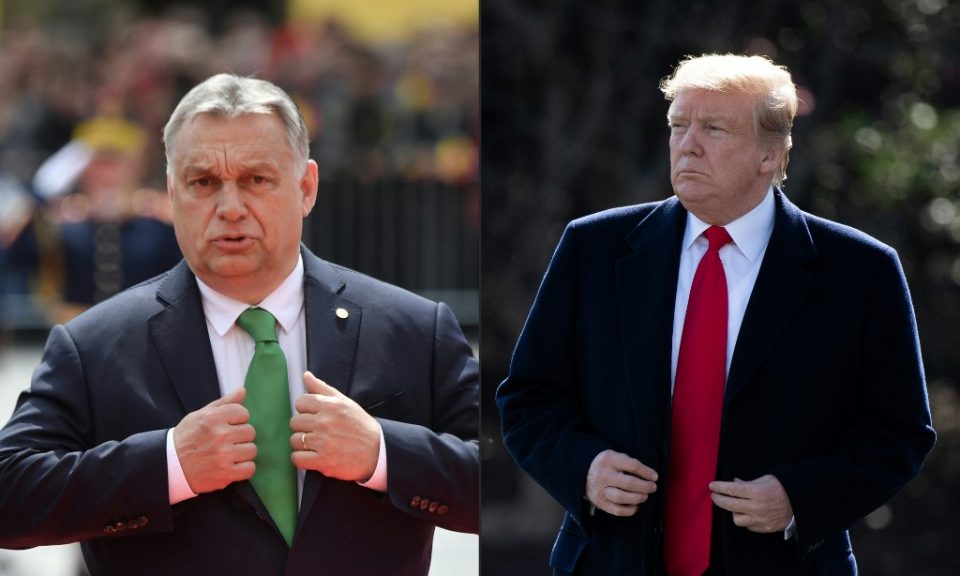
(FILES) In this file photo taken on March 28, 2019 US President Donald Trump speaks to the media prior to departing on Marine One from the South Lawn of the White House in Washington, DC, as he travels to Michigan to hold a campaign rally before spending the weekend in Florida. – Donald Trump on May 13, 2019 hosts Hungarian leader Viktor Orban, an anti-immigration firebrand and one of the US president’s few European admirers, at the White House, despite criticism of the visit at home. (Photos by Daniel MIHAILESCU and SAUL LOEB / AFP)
by Francesco FONTEMAGGI
WASHINGTON, United States (AFP) — US President Donald Trump on Monday will host Hungarian leader Viktor Orban — an anti-immigration firebrand and one of his few European admirers — at the White House, despite criticism of the visit at home.
Orban’s one-on-one talks with Trump will offer the Euroskeptic prime minister a choice podium less than two weeks before the start of European Union parliamentary elections in which far-right parties are expected to make a strong showing.
Orban’s hardline — some would say xenophobic — stance against refugees and “Brussels bureaucrats” has alienated even former conservative allies.
“Recognizing the long-standing ties between the United States and Hungary, the president and the prime minister will discuss ways to deepen cooperation on a range of issues, including trade, energy, and cyber security,” White House press secretary Sarah Sanders said when she announced the visit.
That announcement came on the same day that US Secretary of State Mike Pompeo suddenly cancelled a visit with German Chancellor Angela Merkel in Berlin to go to Baghdad, amid mounting tensions with Iran.
Trump has shown a preference for meeting with authoritarian leaders over Washington’s traditional Western allies — he has also welcomed Egypt’s Abdel Fattah al-Sisi and Turkey’s Recep Tayyip Erdogan to the White House.
In September, Orban — in office since 2010 — praised Trump as “a phenomenon, an icon” among nationalists and isolationists worldwide, after Trump denounced a “globalist” view of the world in a speech at the United Nations.
Calls to cancel the visit
US ties with Budapest were chilly under Trump’s predecessor Barack Obama, who often chided Orban for cracking down on civil liberties and freedom of the press in Hungary.
But relations have since warmed, as Orban’s anti-immigration campaigns in Europe echo many of the themes of Trump’s own drive to build a wall on the US-Mexico border and his attempts to thwart migrants seeking US asylum.
Critics, however, believe Orban should not be welcomed in Washington.
“Hungary’s prime minister does not belong in the Oval Office,” wrote Rob Berschinski of Human Rights First and Johns Hopkins professor Hal Brands in a Washington Post opinion column.
“The visit is a grievous mistake — not just because it will be seen as an endorsement of a leader who has successfully dismantled a democracy, but also because it will signal affirmation of an agenda that is fundamentally threatening to transatlantic security.”
Of particular concern are the increasingly close ties between Hungary — a NATO member — and Russia. Pompeo even warned Orban about those ties on a visit to Budapest in February.
In a letter, several Democratic lawmakers also called on Trump to postpone the meeting until Orban “returns his country to the path of democracy and respect for human rights.”
In a separate letter, a group of influential Democratic and Republican senators urged Trump to express his concern to Orban about “the erosion” of democracy in Hungary.
When asked whether human rights and press freedoms would be discussed at the Trump-Orban talks, a senior US administration official with knowledge of the meeting demurred.
“The point of this meeting is simply just to reinforce the strategic relationship between allies,” the official said, “not necessarily just thrash out every issue on the bilateral agenda, which we have been doing constantly for the last two years.”
© Agence France-Presse
